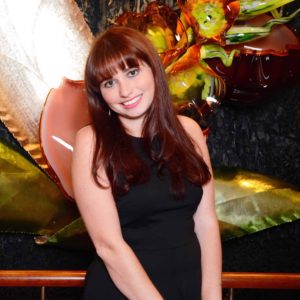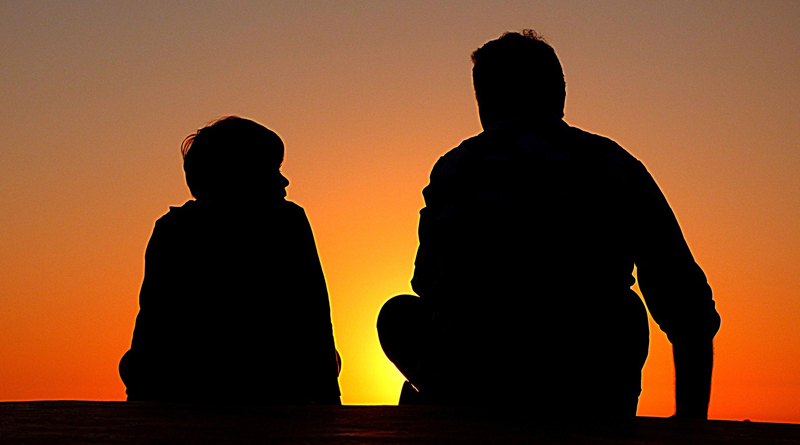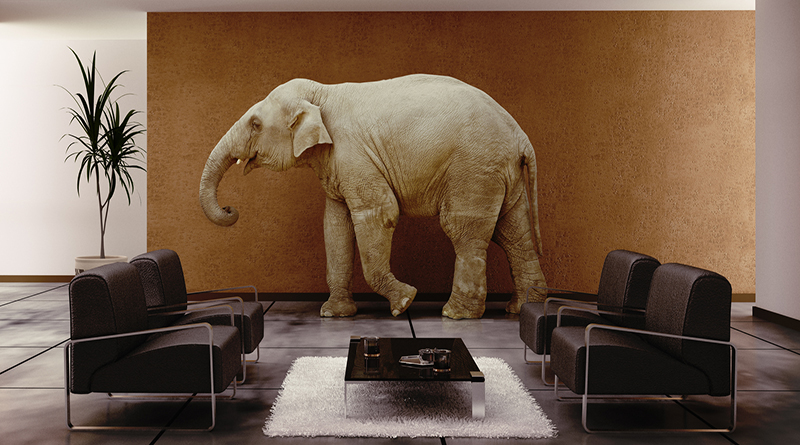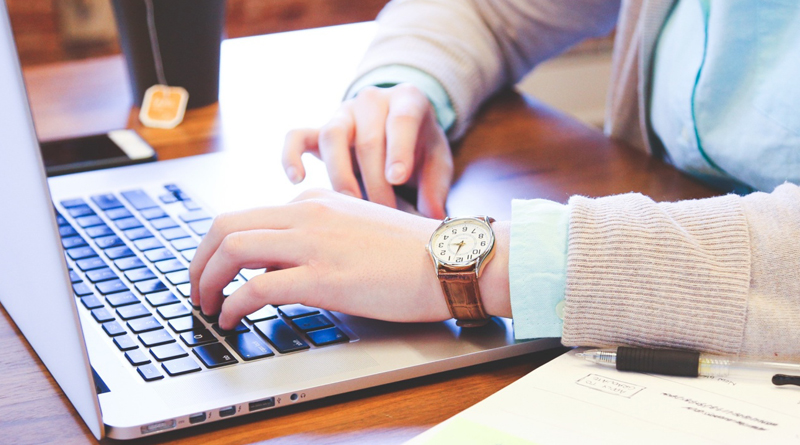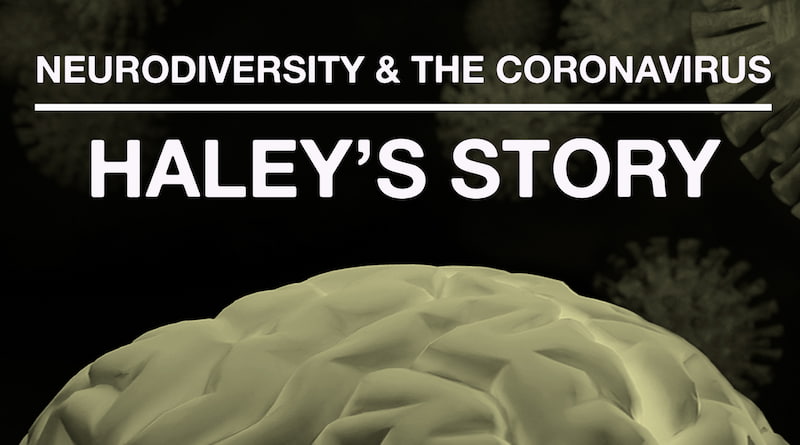
The Coronavirus Pandemic: Haley’s Journey With Autism
The Pandemic: Haley Moss’s Story:
About the Author:
Haley Moss was diagnosed with autism at age 3 and is an associate attorney at Zumpano Patricios in Coral Gables, Florida. She graduated with her Juris Doctor from the University of Miami School of Law in 2018, and graduated from the University of Florida in 2015 with Bachelors degrees in Psychology and Criminology.
Being a Board Member for Different Brains:
Q: What is your role as a board member for Different Brains?
A: I think, for me, being on the board is about making sure that the voices of the neurodiverse are heard, because something I think is really important [in terms of other organizations that generally serve neurodiverse populations] is, you have to have the voice of people from the population you serve in your leadership or on your board. There’s nothing about us that’s about that mentality. I always try to be sure to provide that perspective when I can, and I want to make sure that the work Different Brains is doing is truly inclusive and accessible to neurodiverse people.
My favorite thing that I get to do on the ground on Different Brains is, I co-host the Spectrumley Speaking podcasts. We record episodes about once a week, and we air every other week. I’ve met so many great people through Spectrumley. I’m really glad we have the conversations that we do because I think the conversations we chose to have are important. I think that they are able to bring people together and I hope they are educational—especially for women by women on the spectrum. I think it’s SO important we address issues that surround women, non-binary folks, and people that also aren’t men.
Life Before the Pandemic:
Q: Describe your everyday life before the pandemic hit and include social aspects.
A: Before the pandemic hit, I was regularly traveling the country. I was mostly doing public speaking, leading workshops, and speaking at conferences, so most of the time I spent when I wasn’t at home was on the road, at airports, going to and from different places, and being in large gatherings. Which, of course, didn’t happen in the pandemic. Socially, I’d still see friends, I’d still get to go to in-person meetings for things in the local business community because at the end of the day, I was a small-business owner. I’d also go to things in the legal community because I’m an attorney, so I was still a lot more involved in-person in our community and also nationwide. So, every day was different, but I was always going somewhere or trying to interact with as many people as possible. I would talk about my own experiences [as an autistic person], I would talk about neurodiversity, I would talk about autism at work… all these different aspects of disabilities and neurodiversity. Most of my audiences at conferences were educators, universities… so I was pretty much everywhere before the pandemic hit. Maybe two days before lockdown began happening, I was coming home from Alaska… And as a speaker, [public speaking] is part of my business as well as consulting and writing. So that’s how I had it all structured. That was being a one-person team. I was the sole person doing all the working, all the speaking, all the consulting work… all that stuff was what I did full-time, after leaving my last law firm job. I started my new business around New Years.
Reacting to the Coronavirus & Social Distancing:
Q: How did you initially react to the coronavirus and social distancing?
A: When I did end up leaving for Alaska, it was the first week of March, and I knew that things were starting to get bad quickly because my dad’s a healthcare worker. He gave me masks to go through the airport and [the people at the airport] were telling me to stay away from people—try not get too close, wash your hands a lot… At the time, it wasn’t really hitting as much, as we obviously know it would hit much later. Right then, my initial reaction was just to take precautions, be safe, wear masks for planes and airports, wash my hands whenever I had the chance… so at first, I was kind of prepared, but cautious because I didn’t really know if it was gonna happen.
By the time I was coming home, about ten days later, I was nervous. I was scared because flights were being cancelled, things were starting to lock down in places like California. Florida locked down two or three days after that. When I was coming home, I remember sitting in the airport in Dallas, which was my favorite part of the day, praying that my flight wasn’t gonna get cancelled. I ran into somebody I knew, on my way home, and we were both saying, “If this flight gets cancelled, we’re renting a car and driving back to Miami—we’re going to figure this out”, because we were all afraid when it first started happening. When you’re traveling, you’re really afraid because you do have more exposure, you are in all these different places, you’re interacting with a lot of people, you’re shaking hands, you’re around people constantly. It was starting to unfold while I was in Alaska because events were starting to get cancelled, and Alaska is probably one of the least concerned places you could be, because it’s Alaska. It’s very different than the lower 48 generally. They see things a lot differently than we do. So, the fear was a little bit less widespread when I was there. As far as social distancing, I didn’t think of it as too big of a change, honestly, because I know, as an autistic person, that my social life is kind of limited anyway. I know that professionally, and I though the switch to things being virtual was something I was hopeful about because I thought it would be easier, I thought it would be better to be more connected, it would be far more accessible to more people.
Q: How are you limited socially?
I think it’s just harder to make new friends. Also, I don’t get invited to things socially as much as friends or other people that I know, or going out, I might not be invited either because I’m not thought of or because they think it might be too much for me… people jump to conclusions, and it’s something I aim to fight.
Life Changes & Adaptations:
Q: In what ways did your life and schedule change as a result of the coronavirus?
A: Almost every in-person event has been cancelled, but probably up until sometime up in the fall, and even in the fall, no one really knows what’s going on. Everything’s either shifted to virtual or being postponed and I also moved back home with parents. I moved back home, out of my one-bedroom apartment because I didn’t want to be alone. I knew that quarantine was going to last a while, but I didn’t know HOW long. I knew that I didn’t want to be alone, and my parents were like, “Come back home,”, so I came back home. I’m in my childhood bedroom. With the routine schedule changes, it’s not just me on my own 24/7. My mom cooks every night, which is actually really great! There are things that are really great about being home and there are things that you’re like, “This is very different”. And also, the fact that different things aren’t open… Even being home is different from being at home by myself. My parents wake up earlier than I do, so I’m forced to get up earlier than I used to. Travel days, I’d always get up unreasonably early because I took the first flight of the day. That was kind of my goal: take the earliest flights if I can. On non-travel days, I’d sleep a lot because your body takes wear and tear from sleep from travel. Most days here start earlier because everybody else is up earlier. I didn’t have pets in my apartment, so I’m used to helping out with our dog and our cat. Just other things that weren’t part of my life on my own are definitely part of my life being home.
Q: What have you had to do in order to adapt to these circumstances:
A: It’s not as big of an adaptation as you’d think because I’m an only child, I’ve lived at home my entire childhood, I was home for a year during college, I always came home from school breaks. Living at home isn’t something that’s super new to me, it’s just of having to kind of figure out how to send a signal when you’re working and when you’re not. Just things like that, and also realizing you can’t just go out for fun, you can’t really go to restaurants… It’s kind of scary! I think it’s difficult to set a new routine for anybody, really. I think that’s the biggest adaptation: trying to set up new routines.
Autism, the Coronavirus, & Coping With Change:
Q: How has the coronavirus impacted your autism, or how has being autistic affected the way you’re dealing with it?
A: I think as an autistic person, I really crave that routine and schedule, and it’s hard to find it, especially when there’s new information coming in every day. Different things are getting restricted or opening. It’s really difficult, and also just being in an environment that isn’t your everyday environment, and your work not being the same as it was. You have to find a new routine, and you even find different ways to take care of yourself. You’re trying to keep things as normal as possible or find a new normal, and it’s really difficult—especially when that’s the one thing that keeps your life in balance.
Q: What coping mechanisms are you using in order to deal with these unusual times?
A: I always try each day to try and find something that brought joy or made me feel good. I always try to move every day if I can, so I try to find a way to get outside. First, it was taking walks. Then, it was bike riding with my dad. I also like to do things that interest me, whether it’s reading or playing video games. Something that brings me calm and joy every day makes things better as well.
Life Lessons:
Q: What have you learned about yourself and the world around you as a result of these circumstances?
A: I think what I learned more about the world, especially for people with disabilities, is the world has not been as accepting as it could be, and people just don’t want to make the efforts to include [those with disabilities]. It’s so obvious with how things went remotely because when people with disabilities ask for opportunities to work remotely. For instance, they were told it was unreasonable or not possible. With the pandemic, we went virtual and all these things happened very very quickly. It was of course reasonable to make sure people don’t get sick, but when someone actually needs that because of pain or some other disability is seen as too much, you’re kind of exposing the realities of being a person with disabilities on a wider scale. But I also think it really breeds innovation because we’re showing that it’s possible. I hope that message stays long after COVID-19. It makes me hopeful.
I’ve learned that I’m resilient and I’m able to adapt and adjust better than I think that I gave myself credit for. I think we have a tendency to not give ourselves enough credit for things, and I think when we look back, we realize that we are capable of a lot more than we think. I try to be positive about it—there’s no way to ignore that things are really hard, but there are ways you can do better.
Story by: Haley Moss
Interviewed by: Julia Futo
Interviewed on: June 1st, 2020
Julia Futo was born on August 5th, 1999, in Fort Lauderdale, Florida. She faced difficulties early on in life with trying to perform everyday tasks. Before she was five years old, she was diagnosed with two learning disabilities: Encephalopathy and developmental coordination disorder (DCD). She struggled in school for a long time, but that changed when she took journalism in high school and learned how to become an advocate. She is currently in college and hopes to help others find their voices.

